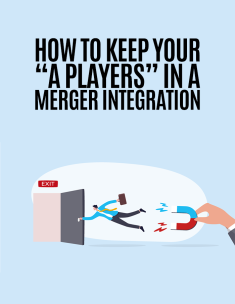Effect of Mergers and Acquisitions on Employee Morale
The trust level drops dramatically in an acquired company when major changes are made post-sale. Morale heads south. Loyalty, the tie that binds, comes unraveled. Job stress hits new highs. The overall effect can be punishing, like a hard fist slammed into the stomach of the organization. And it can knock the wind out of work groups.
As a manager, you’d better take these emotional matters seriously. Strong feelings strongly influence people’s behavior. What all this means is that your job gets a heck of a lot harder. It does not mean that you should make attitudinal issues such as morale, trust, and employee loyalty your top priorities. You shouldn’t.
For now you should focus on problems, not symptoms. Tangibles rather than intangibles. Hard results instead of soft issues. You could waste a lot of precious time and energy chasing the wrong rainbows.
These matters of morale, trust, loyalty, and such are best thought of as by-products. They come about, indirectly, as a natural consequence of good management and good results. You can pursue them all you want, but you’re basically just spinning your wheels unless you’re managing the place right and pulling off some victories.
So don’t make these intangibles during the integration the focal point of your efforts. It’s not enlightened management—it’s a big mistake.
What’s your best bet for building trust? Simply be trustworthy in the way you have your group pursue productivity and profits. Want to help your people handle job stress? Eliminating "stressors" through effective change management helps far more than concentrating on “stress training.” Worried about morale, loyalty, and job commitment? Watch these matters take care of themselves when the team really starts cranking. Success is the magic potion that cures so many of the “soft” organizational ailments that accompany M&A.
The idea here is not to diminish the importance of these intangible factors. They are vital to the long-term success of your organization. The point is simply that they should not be the “stuff ” of your short-term objectives. For now your focus must be on tangible targets...hard results.
Shoot for wins that demonstrate the merger is working, operational improvements such as sales gains, quicker delivery, better yields, shorter product development cycles, higher customer satisfaction, and fewer quality defects.
Focus on the stuff that heads straight to the bottom line, or contributes directly to competitive position.
Stake out specific targets. Aim for a very few—but ambitious—goals. Go for gains you can actually measure.
A results-oriented strategy does the most to improve employee attitudes. Winning provides the most positive influence on the dispirited and disaffected.
Shoot for operational improvements that demonstrate the merger is working.
Morale, trust, loyalty and commitment, work stress—these are very important attitudinal components. They all count. If any one of them is out of whack, the organization suffers. Collectively, they carry enough punch to make or break your teams. But you need to see them as symptoms—like fever, a headache, or nausea. And instead of popping pills or slapping on Band-Aids®, you should focus on fighting the causes of those organizational aches and pains. Get rid of the root problems, and see how the unpleasant symptoms disappear. That’s good medicine...and good M&A integration management.





